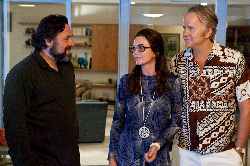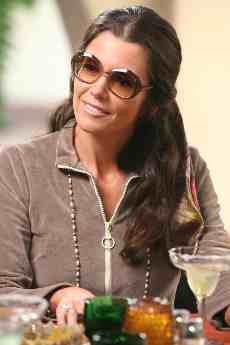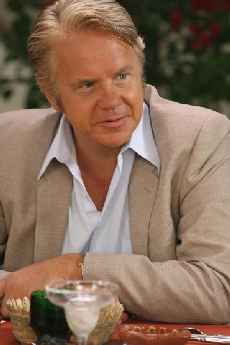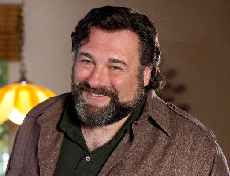|
|
 |
|
| |
Film
|
| |
 |
DIANE LANE, TIM ROBBINS AND JAMES GANDOLFINI STAR IN HBO FILMS’ CINEMA VERITE
DIANE LANE, TIM ROBBINS AND JAMES GANDOLFINI STAR IN HBO FILMS’ CINEMA VERITE, A DRAMATIC LOOK AT THE MAKING OF THE GROUNDBREAKING DOCUMENTARY “AN AMERICAN FAMILY,” DEBUTING APRIL 23
--------
Patrick Fugit, Kathleen Quinlan, Lolita Davidovich, Shanna Collins And Thomas Dekker Also Star
--------
HBO Films Presents A Pariah Production; Directed By Shari Springer Berman And Robert Pulcini; Written By David Seltzer; Gavin Polone And Zanne Devine Executive Produce; Karyn McCarthy Produces
--------
In 1973, the Loud family became a television sensation of a new kind. It was long before a metal rock star showed his eccentric family on the small screen and decades before housewives had screaming matches with each other on camera in public.
CINEMA VERITE tells the behind-the-scenes story of the groundbreaking 12-hour PBS documentary series “An American Family,” which chronicled the lives of the Louds in the early 1970s and catapulted the Santa Barbara family to notoriety while creating a new genre: the reality TV series. Oscar®, Golden Globe and Emmy® nominee Diane Lane (“Secretariat,” “Unfaithful”), Oscar® and Golden Globe winner Tim Robbins (“Mystic River,” “Dead Man Walking”) and Golden Globe and Emmy® winner James Gandolfini (“Where the Wild Things Are,” HBO’s “The Sopranos”) star in the HBO Films presentation, directed by Oscar® nominees Shari Springer Berman and Robert Pulcini (“The Nanny Diaries,” HBO’s “American Splendor”) and written by David Seltzer (“The Omen,” “Punchline”). CINEMA VERITE debuts SATURDAY, APRIL 23 (9:00-10:45 p.m. ET/PT).
Other HBO playdates: April 23 (2:00 a.m.), 24 (6:00 p.m.) and 26 (11:30 a.m., 9:00 p.m.) and May 1 (4:45 p.m., 1:00 a.m.), 6 (1:15 p.m., 8:00 p.m.), 7 (11:45 a.m.), 9 (12:30 p.m., 9:00 p.m.), 12 (4:30 p.m., 11:45 p.m.), 15 (10:15 a.m.) and 17 (midnight)
HBO2 playdates: April 28 (9:15 a.m., 9:00 p.m.) and May 4 (midnight), 8 (10:45 a.m., 8:00 p.m.), 13 (1:15 p.m.), 18 (2:30 p.m., 11:00 p.m.), 21 (5:00 p.m., 3:05 a.m.), 23 (5:15 p.m.) and 29 (10:00 p.m.)
The film also stars Patrick Fugit (“Almost Famous,” “Saved!”), Kathleen Quinlan (“Apollo 13,” “A Civil Action”), Lolita Davidovich (“Hollywood Homicide,” “Gods and Monsters”) and Shanna Collins (“Swingtown,” “In My Sleep”). The Loud children are played by Thomas Dekker (“Terminator: The Sarah Connor Chronicles,” “A Nightmare on Elm Street”) as Lance; Johnny Simmons (“Scott Pilgram vs. The World,” “Jennifer’s Body”) as Kevin; Nick Eversman (“The Runaway,” “Vampires Suck”) as Grant; Caitlin Custer (“Memphis Beat,” “Swingtown”) as Delilah; and Kaitlyn Dever (“Justified,” “Bad Teacher”) as Michele.
CINEMA VERITE is an HBO Films presentation of a Pariah Production; Gavin Polone (“Gilmore Girls,” HBO’s “Curb Your Enthusiasm”) and Zanne Devine (“Easy A,” “The Guardian”) executive produce; Karyn McCarthy (“Syriana,” HBO’s “John Adams”) produces.
“An American Family” was a total departure from the television shows of the time when it aired in 1973, and brought public scrutiny to a family unprepared for the consequences. CINEMA VERITE shows how the Louds were thrust into the spotlight as parents Pat (Diane Lane) and Bill (Tim Robbins) struggled with their marriage while raising their children. In particular, Pat was criticized for asking for a divorce and for her support of her openly gay son Lance (Thomas Dekker) at a time when homosexuality was rarely represented on television.
CINEMA VERITE gives a behind-the-scenes look at how the original PBS series was created by filmmaker Craig Gilbert (James Gandolfini), focusing on the seven-month period in 1971 when the original footage was filmed. While he aimed to have an impact on culture, he also felt that the family’s struggles were relatable to many Americans in a way that the Brady Bunch and the Partridge Family were not. The crew of Alan and Susan Raymond (Patrick Fugit, Shanna Collins), who did the filming, were often at odds with Gilbert about what content was appropriate to shoot.
The 1973 airing of “An American Family” drew more than ten million viewers, sparking widespread controversy and harsh criticism of the family. It was widely discussed in the media, with the Loud family appearing on the cover of the March 12, 1973 issue of Newsweek.
World renowned anthropologist Margaret Mead observed, “[‘An American Family’] is, I believe, as new and as significant as the invention of drama or the novel – a new way in which people can learn to look at life, by seeing the real life of others interpreted by the camera.”
In 2002, TV Guide named “An American Family” one of The Top 50 Greatest Shows of All Time.
ABOUT THE FILM
HBO Films: Cinema Verite Trailer (HBO)
 |
| James Gandolfini , Diane Lane and Tim Robbins |
In addition to their success in the feature film world, the Academy Award®-nominated team of Shari Springer Berman and Robert Pulcini have a rich background in documentaries and films with true-life subject matter, and seemed the perfect choice to helm CINEMA VERITE.
“Having started out as documentary filmmakers, we actually made verite-style films,” says Springer Berman. “There’s always this moral question of whether you’ve gone too far. You have a conflicting agenda of telling a compelling story, yet trying not to push things in a direction that they wouldn’t naturally occur. All these issues really drew us in. We related to both Craig and the Raymonds.”
In capturing the spirit of the ‘70s, Berman and Pulcini, in essence, returned to their own childhoods. “As kids growing up on the East Coast, we were bombarded with images of California families,” explains Pulcini. “They really influenced us – The Brady Bunch, the Partridge Family – ideal families living the American dream in the sun. And here we are in 2011 revisiting those ‘70s images, but making a film about the flip side of that fantasy, about a beautiful, well-to-do, but dysfunctional West Coast family who was exploited, not celebrated, by television.”
Continues Pulcini, “But I do think there’s a very human story at the heart of this film, which is all about the power of family, however imperfect and flawed. When the whole country turns against the Louds, you see that they still function as a family, regardless of how intact they are as a unit. At the time, it was a unique idea to go on TV and show that aspect of family life. Today, families are always changing; the concept of families is always changing. I think the Louds, in many ways, were ahead of their time.”
“One of the central themes of the film is the value of family, how they are constructed in strange, wonderful, painful ways,” observes executive producer Zanne Devine. “I think there’s something really beautiful about the way they stuck together through the storm and have an amazing bond.”
David Seltzer, who wrote the script and also came from a documentary background, recalls the impact of the original series, saying, “I knew about ‘An American Family’ when it first went on the air; it was the first time that somebody opened up their door for cameras to film them as they really were. No one called it ‘reality TV,’ or had any idea it would become a phenomenon that would eventually swamp the airwaves. Everybody thought it was just a one-off.”
The emotional fallout from the airing of “American Family” in 1973 was surprising and overwhelming. The family was vilified by critics and the American public.
Diane Lane, who plays Pat Loud, comments, “No one was prepared for the kind of backlash that resulted. The family was, in essence, stoned in the town square, burned in effigy. They were a tool in a machine that didn’t know what to do with them, and the public and press were so unforgiving for violating the image of the American family that people wanted to believe about themselves. I think America just didn’t know how to separate the hall of mirrors that this art form reveals. They didn’t like what they saw in the mirror.”
Tim Robbins, who plays Bill Loud, adds, “I think you have to understand the context in which America saw this first representation of what it is to be a family, having cameras on you. It was a major breakthrough for a large segment of the population that was living in the shadows…and in shame in many communities throughout America. Imagine being a gay man in 1973 in a community that considered you a weirdo and an outcast and, oftentimes, you felt your own safety was at risk. And all of a sudden on American television comes Lance Loud, who is openly and proudly gay. I believe it was a major liberation for a lot of American males. It’s taken on a legendary status as something that probably started a sea change in the way homosexuals are perceived.”
A clip of Lance Loud on “The Dick Cavett Show” convinced Thomas Dekker to take the part. “When I read the script I thought he was just this kind of flamboyant guy,” explains Dekker. “But when I watched his interview, I saw that he was such a myriad of things. He was famous for being the first openly gay young guy on television and in the public, and that was a brave thing to do in that time. He had this confidence to go completely in his own direction and no matter how eccentric or daring it was, to him, it was very honest and truthful.”
Although the perception was incorrect, many people who watched the original series believed Lance “came out” in the Central Park scene with his mother. “Lance was open and positive about his sexuality, and his family accepted him,” says Springer Berman. “It may have surprised some viewers, but the family loved him for who he was. He never ‘came out,’ per se, on the show, but he didn’t hide who he was, either, and it was a first for television. I actually think it was America who came out when they met Lance.”
The differing points of view of Gilbert and the Raymonds became a source of conflict during the filming of the original series. “The question of why Pat Loud agreed to the show still gives everyone something to chew on,” says Devine. “Why would a woman whose marriage was in a difficult spot allow cameras to come in and capture all of that? Perhaps it was some way to free her of the situation – having something observed allows one to see it differently.”
“Craig Gilbert was incredibly eloquent and he related to Pat on an intellectual level, using philosophy and the greater good of the culture to sell his ideas,” says Springer Berman. “Of course, as any good filmmaker, he also wanted to get the best footage to make an interesting show.”
“As a documentary filmmaker, you struggle to remain detached,” adds Pulcini. “But the Raymonds really cared about this family and inevitably got so close that it influenced their judgment. It was a big experiment for them as well, to be asked to actually live among this family while being expected, in the way their art required, to expose them.”
James Gandolfini, who plays Craig Gilbert, says, “I think ‘An American Family’ had good intentions. It started with somebody who wanted to document a family in the ‘70s; it was an intellectual exercise and it was exceptional. We see where it started out, what were the consequences, and how, years later, it has sadly morphed into today’s reality TV.”
“CINEMA VERITE is about the secrets we all have, which, if exposed, can change the way we feel about ourselves,” explains Seltzer. “It is a human need to be known, and having a camera in front of you brings that out. Maybe too much so. That, unfortunately, is what ‘reality television’ is all about today.”
ABOUT THE PRODUCTION
CINEMA VERITE was shot mostly on location in and around Los Angeles, with additional filming in New York.
The job of recreating 1970s Santa Barbara and New York fell to talented Emmy® Award nominated production designer Patti Podesta (“Bobby,” HBO’s “Recount”).
“The Louds had incredible style in a very unselfconscious way,” explains Podesta. “To stay true to that, the tone of the locations and décor had to depict the appropriate socio-economic class and style of the family in the early ‘70s in a way present-day audiences would grasp.”
She continues, “Their taste was really eclectic for the period. Bill traveled a lot and Pat had a sort of sophisticated upbringing. She went to Stanford and studied art history. They had Chinoiserie pieces and they mixed exotic with high European. Their style didn’t look like ‘The Brady Bunch’ or anything stereotypical of the decade.”
Suttirat Anne Larlarb was presented with the task of designing and recreating the wardrobe for the film, which she refers to as “transitional period” clothing.
“What’s intriguing about this particular time, 1971, is that it’s not the cartoonish kitschy version of the decade, with the big polyester collars and wide bell bottoms,” says Larlarb. “The casual comfort of the late ‘60s in Southern California bleeds over into the early ‘70s attire, giving us the look of the film. Some scenes called for the character’s clothes from the documentary; others allowed for the freedom to capture the spirit of the times. There’s also this great juxtaposition with Lance, who discovers urban sophistication and fashion forwardness when he escapes to New York.”
ACTOR BIOS
 |
| Diane Lane |
Diane Lane (Patricia Loud) received critical acclaim for her performance as Penny Chenery in “Secretariat.” She was nominated for an Oscar®, Golden Globe and SAG Award for “Unfaithful” in 2002. Lane was also nominated for a Golden Globe for “Under the Tuscan Sun” and for an Independent Spirit Award for her lead role in “A Walk on the Moon.” Her other credits include “A Little Romance,” “The Perfect Storm,” “Nights in Rodanthe,” “Hollywoodland,” “Must Love Dogs,” “My Dog Skip,” “Rumble Fish,” “Lonesome Dove,” “The Outsiders” and “The Cotton Club.” Lane will play Martha Kent in Zack Snyder’s feature film reboot of “Superman,” slated for 2012.
 |
| Tim Robbins |
Actor, director, writer and producer Tim Robbins (Bill Loud) won an Oscar®, Golden Globe and SAG Award for his role as Dave Boyle in “Mystic River.” For “Dead Man Walking,” he was nominated for an Oscar® for directing, nominated for a Golden Globe for the screenplay and won a Humanitas Award, as well as four awards at the Berlin Film Festival. He won the Golden Globe and Best Actor at the Cannes Film Festival for his lead role in “The Player” and was nominated for a Golden Globe for the title role in “Bob Roberts” (which he also wrote and directed). His other credits include “The Secret Life of Words,” “Catch a Fire,” “The Shawshank Redemption,” “Short Cuts,” “Bull Durham,” “War of the Worlds,” “The Hudsucker Proxy” and “Cradle Will Rock.” Robbins can be seen in the upcoming film “Green Lantern.” He has served for the last 30 years as the artistic director of the theater company Actor’s Gang, which has staged more than 80 productions and won more than 100 awards. His Iraq war satire “Embedded” played to sold-out audiences for five months at New York’s Public Theater in 2004 before moving to London and touring the U.S. He recently directed an adaptation of George Orwell’s “1984,” which has toured four continents and 40 states over the past three years. Robbins’ stage adaptation of “Dead Man Walking” has been performed at more than 140 universities nationwide. Robbins was also the director of the episode of the HBO drama series “Treme” that debuts May 1.
 |
| James Gandolfini |
Three-time Emmy® winner James Gandolfini (Craig Gilbert) portrayed Tony Soprano in the hit HBO series “The Sopranos” for six seasons, for which he was also honored with a Golden Globe Award and multiple SAG awards. He has also executive produced the HBO documentaries “Wartorn 1861-2010” and “Alive Day Memories: Home from Iraq,” which was nominated for a 2008 Emmy®. Gandolfini’s other film credits include “Where the Wild Things Are,” “The Taking of Pelham 1-2-3,” “In The Loop,” “All the King’s Men,” “The Man Who Wasn’t There,” “The Mexican,” “8MM,” “A Civil Action,” “The Mighty,” “Fallen,” “The Juror,” “Get Shorty,” “Crimson Tide” and “True Romance.” On Broadway, he starred in the Tony Award-winning 2009 revival “God of Carnage,” for which he was also nominated for a Tony Award, and recently reprised his role in the play at the Ahmanson Theatre in Los Angeles.
Patrick Fugit (Alan Raymond) made his film debut as teenage rock journalist William Miller in the Oscar® and Golden Globe winner “Almost Famous.” His other credits include the title character in “Bickford Shmeckler’s Cool Ideas,” plus “Saved!,” “White Oleander,” “The Amateurs,” “The Good Life,” “Horsemen” and “Cirque de Freak: The Vampire’s Assistant.”
Kathleen Quinlan (Mary Every) starred as Marilyn Lovell in the award-winning film “Apollo 13,” for which she was nominated for an Oscar® and a Golden Globe. Her other credits include “Made of Honor,” “A Civil Action” “Breakdown” “Poundcake,” “Breach,” “El Padrino,” “My Giant,” “Event Horizon,” “Zeus and Roxanne,” “The Hills Have Eyes” and “The Doors.” She also starred in the TV series “Family Law” and “Prison Break.”
Lolita Davidovich’s (Val) credits include “Hollywood Homicide,” “Gods and Monsters,” “Mystery, Alaska,” “Cobb,” “Intersection,” “Leap of Faith,” “Raising Cain,” “September Dawn,” “Dark Blue,” “No Vacancy” and “Jungle 2 Jungle.” Her TV credits include “ZOS: Zone of Separation,” “The L Word,” “The Agency” and HBO’s “Indictment: The McMartin Trial” and “Curb Your Enthusiasm.”
Shanna Collins’ (Susan Raymond) credits include the films “In My Sleep,” “The Haunting of Molly Hartley,” “Loaded,” “On the Doll” and “Chandler Hall.” On TV, she played Laurie Miller in “Swingtown,” and has appeared on “Castle,” “CSI: Miami,” “Without a Trace,” “Medium” and “Criminal Minds.”
Thomas Dekker (Lance Loud) received critical acclaim for his portrayal of John Connor in the hit series “Terminator: The Sarah Connor Chronicles.” He recently starred in Gregg Araki’s film “Kaboom,” and leads an all star cast as a grief-stricken young parent in the upcoming independent film “Angels Crest,” which will debut at this year’s Tribeca Film Festival. His other credits include Michael Bay’s reboot of “A Nightmare on Elm Street,” “My Sister’s Keeper,” “From Within,” “All About Evil” and “Laid to Rest.” He has also appeared in the series “Heroes,” “7th Heaven” and “Boston Public.”
FILMMAKER BIOS
Shari Springer Berman and Robert Pulcini (directors) were nominated for an Oscar® and won the Writers Guild Award for their adapted screenplay for “American Splendor,” which they also directed. The film was honored with the Fipresci Prize at the Cannes Film Festival, won the Grand Jury Prize at the Sundance Film Festival, was nominated for five Independent Spirit Awards and was selected Best Film and Best Screenplay by the National Society of Film Critics and the Los Angeles Film Critics Association. Made by HBO Films and Fine Line Features, “American Splendor” told the story of underground comic book creator Harvey Pekar (Paul Giamatti). The duo also wrote and directed “The Nanny Diaries,” starring Scarlett Johansson and Laura Linney, and “The Extra Man,” starring Kevin Kline and Paul Dano. Their HBO documentaries include “The Young and the Dead” and “Off the Menu: The Last Days of Chasen’s.”
David Seltzer (writer) is well-known for having written the original feature film “The Omen,” adapted from his own novel, which went on to become a franchise of five sequels, plus a remake of the original, and for “Willy Wonka and The Chocolate Factory.” He directed his original screenplays of “Punchline,” “Lucas,” “Shining Through” and “Nobody’s Baby.” Seltzer’s other writing credits include the miniseries “Revelations,” as well as “The Other Side of The Mountain,” “My Giant,” “Bird on a Wire,” “Dragonfly,” “Table for Five,” “Six Weeks” and “Prophecy.”
Gavin Polone (executive producer) is a longtime executive producer of HBO’s “Curb Your Enthusiasm,” plus “Gilmore Girls” and the current “My Boys.” He has also produced the shows “Hack,” “Revelations” and “The Showbiz Show with David Spade.” Polone’s feature credits include “Panic Room,” “Ghost Town,” “Zombieland,” “Primeval,” “Little Manhattan,” “Secret Window,” “Stir of Echoes,” “8MM” and “My Super Ex-Girlfriend.” His upcoming projects include “Premium Rush” and the series “What Would Jane Do.”
Zanne Devine’s (executive producer) credits include the comedy “Easy A,” which won the Broadcast Film Critics Association Award for Best Comedy Movie and was nominated for a GLAAD Award for Best Comedy, while the film’s star, Emma Stone, was nominated for a Golden Globe Award. Her additional credits include “The Guardian,” “Mardi Gras,” “Bring It On: All or Nothing,” “House of D,” “A Lot Like Love” and HBO’s “PU-239.”
Karyn McCarthy’s (producer) production credits include HBO’s Emmy®-winning miniseries “John Adams,” “Syriana,” the reboot of “Nightmare on Elm Street,” “Repo Men,” “Stranger Than Fiction,” “Wicker Park,” “The Hole,” “The Number 23,” “Against the Ropes,” “The In-Laws,” “The Negotiator,” “What Women Want,” “Driven” and HBO Films’ Emmy®-winning “Something the Lord Made.
HBO Films: Cinema Verite Trailer (HBO)
Top of Page
Copyright ©
2000-2011 by FilmMakers.com. All rights reserved.
FilmMakers.com
is a division of Media Pro Tech Inc.
|
|
|
| |

|
|